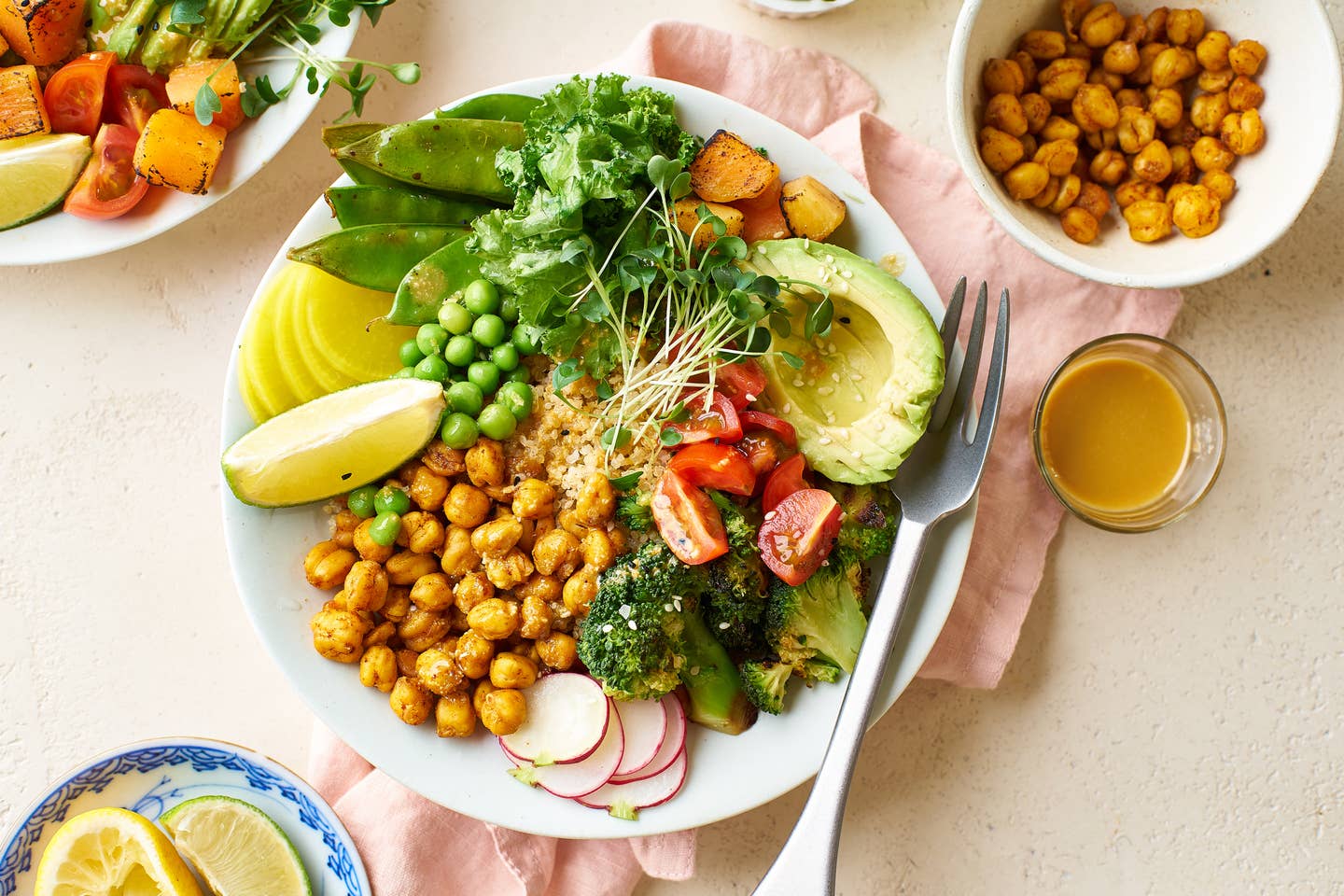
If You Want To Go More Plant-Based, This Is the Perfect Diet for You
Want to lean into plant-based eating but don't know where to start? The pegan diet might be perfect for those transitioning to a more plant-forward plate. No, you’re not imagining things or mishearing “vegan” if you’ve heard the term floating around. The pegan diet is actually a portmanteau of “paleo” and “vegan,” and while not entirely plant-based, it certainly offers some health benefits from the emphasis on vegan eats.
“The pegan diet combines two different diets that include paleo diet and vegan diet (famously known as a plant-based diet),” says Clara Lawson, RDN, a Registered Dietitian Nutritionist who has expertise in personalized nutrition and dietary plans based on individual body types and health needs, who also works with USA Hemp. “75 percent of the pegan diet focuses on plant-based foods, while 25 percent of it allows eating foods that come from animal sources.”
To follow a pegan diet, Lawson advises focusing on vegetables, fruits, nuts, and a small amount of meat. “In other words, a plate of pegan diet contains many fruits and vegetables and a very limited amount of meat at the side of the plate,” she says.
It’s certainly not as good as going completely plant-based, but if 75 percent of people went 75 percent plant-based it would be good for them, the planet, and animals of course. And yes, it will likely be good for your waistline, too, thanks to the regime’s emphasis on fruits and vegetables.
How a plant-based diet can help you lose weight
“A plant-based diet helps you to lose weight in two major ways. Firstly, plant-based foods contribute to a limited calorie count. It means you can eat plenty of plant-derived foods while consuming fewer calories since most vegetables and fruits have low calories in them,” explains Lawson, adding that one can eat larger quantities of plant foods without gaining weight. “Research has confirmed that a plant-based diet allows people to consume about 700 fewer calories in a day as compared to the animal-based keto diet,” she continues.
Next, Lawson highlights the fact that plant-based foods are full of fiber, which “maintains the state of satiety and prevents binge-eating or overeating.” She elaborates: “When your body is having a sufficient amount of fiber, you are very less likely to go for unhealthy snacks, and this way, you don’t feel like eating.”
Another great perk of plant-based diets when it comes to shedding pounds? “Fiber-rich foods also promote good bacteria in your gut and contribute to the production of appetite-reducing hormones,” says Lawson. “So, by controlling your appetite and avoiding unnecessary eating, a person loses weight with the help of a plant-based diet.”
Given all these benefits of a plant-based diet, adopting a predominantly plant-based diet may similarly help you drop pounds. “Going pegan makes a consumer more conscious of what they eat and from where their foods come. This is also similar to a plant-based diet because you focus on sustainable food sources, but you are still consuming meats,” says Dr. Jaydeep Tripathy, a primary care doctor at Doctor Spring, noting that a truly vegan diet excludes all meats, including fish, and dairy, such as eggs. “With a pegan diet, you eat less meat and more fruits and veggies. By consuming healthier foods that are rich in fiber and low in calories, you are filling your tummies without adding to your weight.” Beyond the consumption of animal products, there are some other drawbacks to the pegan diet, like restricting some healthy food choices, such as grains, legumes, and most dairy products, which all have health benefits,” as Tripathy points out.
Other health benefits of going plant-based
But wait, there’s still more! More incredible benefits, that is, of adopting a plant-based diet. Obviously, if you’re on the fence between trying pegan and vegan, we’re all for taking the 100 percent plant-based plunge given the evidence-based science touting its health powers.
“The most amazing benefit of plant-based foods is that it doesn’t let inflammation occur in the body, which is the leading cause of many health problems including cancer and heart diseases,” says Lawson, further noting that a diet that is high in fruits and vegetables (say, a nutrient-dense pegan diet) keeps the immune system strong and inflammation at bay.
“Plant-based foods also help to reduce the risk of cancer significantly. The two major causes of cancer are weight gain and inflammation, and a plant-based diet deals with both these issues and therefore reduces the risk of cancer,” Lawson comments. “Additionally, a plant-based diet is also highly recommended for preventing dementia and other cognitive disorders. The presence of antioxidants in plants makes sure to clear out all the free radicals and protect the brain from cell damage, and that is why it reduces the likelihood of mental problems,” she says.
For all those reasons and more, we think we’ll skip the meat — even if it’s just the “condiment” — and commence quinoa salad and smoothie time in this household.
If you’re looking for more ways to incorporate a healthy, plant-based diet into your day-to-day life, check out our Health and Nutrition articles.
More From The Beet






